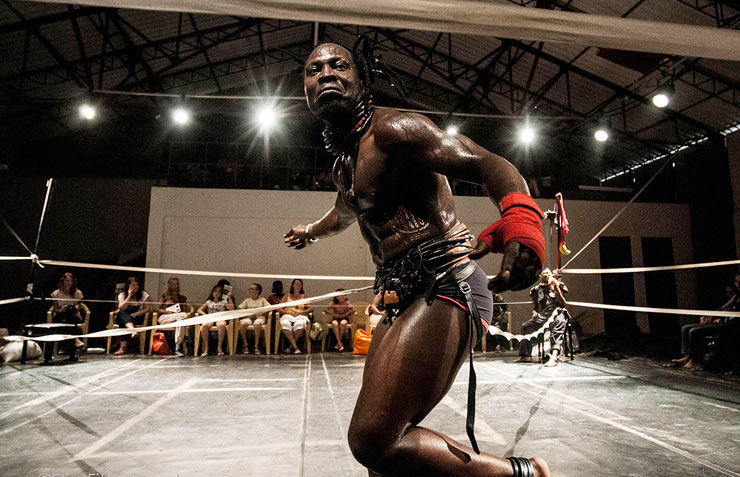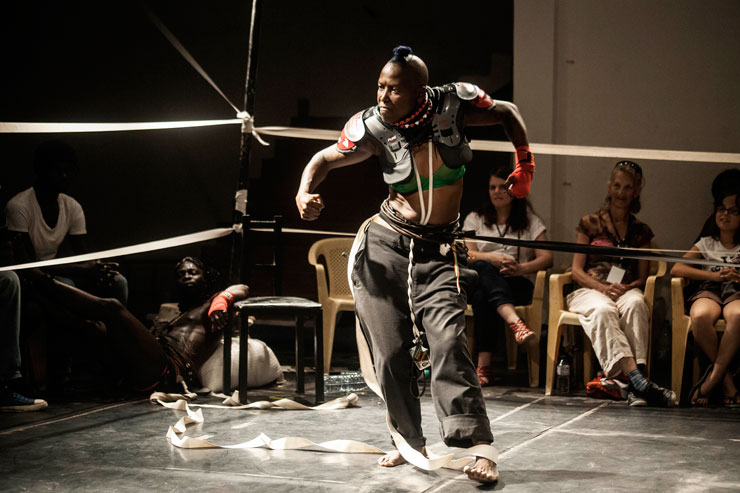
Pape Ibrahima Ndiaye
There was a feeling of apprehension coupled with curiosity that transcended the room as audience members entered the Miami Light Box to experience the journey, the “manifestation,” created by Nora Chipaumire. Brooklyn based and Zimbabwe -born Chipaumire is not subtle. She is on a discovery of what it means to be a black male, the African black male; the father that she never knew.
Produced by MLB in conjunction with MDC Live Arts on Oct. 14 and 15, Chipaumire led her viewers on a quest and questioned her participants, through an intense exploration that left no one in the audience safe from her interactive banter. The theater was hazy with piercing lights projecting out, even to the point that wearing sunglasses was recommended. The space was rigged like a boxing ring, using white elastic bands stretched in a square with many confusing wires, elastics and hanging apparatus implying the need to clarify, to break out, to be free.
It was hard to distinguish what was in the room. The eye needed to adjust to the dark. At closer inspection, there was the larger than life figure of Chipaumire in heavy garb; double shoulder pads, goggles, laden with loose pants and a massive towel. She was tethered to the boxing ring, tethered to people, tethered to the past. She was holding a mic making constant breathy sounds, sometimes understandable, sometimes not. The music contained a blasting a mix of African music, hip-hop and blurry sounds (amazingly produced by Philip White). The light was searing. The room had an electric feel; we were all in this together, there was no escape.
“We’re here, are you ready?” she moaned. “People, I was born ready. This is the manifesto to end all manifestos.”

Nora Chipaumire
The lights were turned inward and we were able to distinguish now the relaxed form of Pape Ibrahima Ndiaye (a.k.a. Kaolack) lounging on one of two boxes that infer the auctioning of slaves. He looked naked, but with closer view we see his wild dreads and the rather painful looking piece of armor covering his privates. He and Chipaumire were connected and encumbered with white elastic. They always seemed to be twisted and caught up; united. Kaolack was the aspect of her father, of the black male trying to evolve, to discover himself.
The third participant, the elegant Shamar Watt, remained constantly in motion. Wearing red sweats with black tuxedo tails, he moved lights, adjusted elastics, disappeared, reappeared, jumped, crawled, added sounds, and kept the atmosphere active even when seemed to be still. He was the passage of time.
A whistle blew, a bell rang, and Round One began. We were ready to learn how to “free the African, how to become the black African man.”
Chipaumire, with her continuous tirade of voice, reminded us, “ You have time, slow down, you want the time.” The actor/performer/dancers moved in slow motion. Kaolack slithered on the floor, he crawled, he tried to find his legs. There was an animal virility to his search.
Chipaumire thankfully blended humor into her intense episode with cell phones, selfie sticks, references to runner Usain Bolt and action hero Bruce Lee, even Miami bling. We were to see ourselves and laugh only to be re-reminded that this was a serious journey.
There are ten steps to becoming the African black man according to Chipaumire. “You have to have swag, to move your hips, you need to be king ...and nigga you need to run. If you’re not gonna run, if you’re not gonna fight, you need to learn to die.”
And there was running. The stage was engulfed in chaotic frenzy. Watt ran and jumped, Cipaumire bellowed, Kaolack was writhing. The boxing ring ends up destroyed; the wires and elastics in turmoil. Culminating in all of the madness, there was an abandoned freedom. The barrier's broken and evolution has occurred.
Quietly and calmly, a blackout morphed into limited light revealing Chipaumire with Kaolack clutched on her back. She carried the weight of her father. It was an episodic search of her father, of the black man, but we had also witnessed Chipaumire’s own journey of resolution. We were exhausted. We were exilirated.
 MAIN MENU
MAIN MENU

